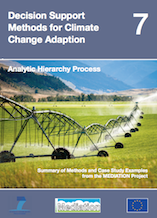Analytic Hierarchy Process


Key Messages
- There is increasing interest in the appraisal of options, as adaptation moves from theory to practice. In response, a number of existing and new decision support tools are being considered, including methods that address uncertainty.
- The FP7 MEDIATION project has undertaken a detailed review of these tools, and has tested them in a series of case studies. It has assessed their applicability for adaptation and analysed how they consider uncertainty. The findings have been used to provide information and guidance for the MEDIATION Adaptation Platform and are summarised in a set of technical policy briefing notes.
- One method that is potentially useful for adaptation is the Analytic Hierarchy Process (AHP).
- AHP is a form of multi-criteria analysis that undertakes pairwise comparisons using expert judgements to derive priority scales. The method helps to consider tangible and intangible elements together, allowing these to be traded off against each other in a decision- making process.
- The method is applied by making comparisons using a scale of absolute judgements that represents how much one element dominates another for a given attribute. The derived priority scales are then synthesised and the various weighted scores are aggregated.
- The approach has high relevance for adaptation as it can evaluate options in situations of high complexity, considering different time horizons, uncertainty and multiple and interdependent variables requiring multi-dimensional trade-offs.
- The review has considered the strengths and weakness of the approach for adaptation. The main strength is the ability to directly compare tangible and intangible elements, taking into account the opinions and preferences of a wide range of people in the analysis of complex problems. It also provides a simple ranking that is easy to communicate.
- The potential weaknesses relate to the increased complexity of application and time taken to apply the approach if many criteria, sub-criteria and options are considered, and the somewhat subjective nature of the approach.
- Previous applications of AHP for adaptation have been reviewed, and Mediation case study applications of the tool are summarised.
- The review and case studies provide useful information on the types of adaptation problem types where AHP might be appropriate, as well as data needs, resource requirements and good practice lessons.
Suggested Citation
Bharwani, S., Varela-Ortega, C., Blanco, I., Esteve, P., Juarez, E., Trombi, G., Moriondo, M., Bindi, M., Devisscher, T., Taylor, R. and Watkiss, P. (2013). Analytic Hierarchy Process (AHP). Decision Support Methods for Adaptation, MEDIATION Project, Briefing Note 7.
The research leading to these results has received funding from the European Community’s Seventh Framework Programme (FP7/2007-2013) under grant agreement no. 244012.
(0) Comments
There is no content